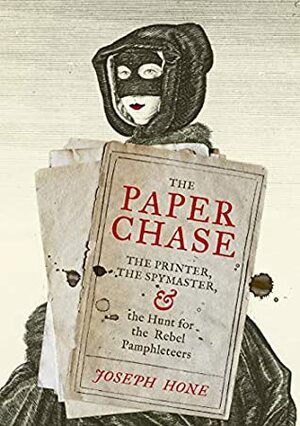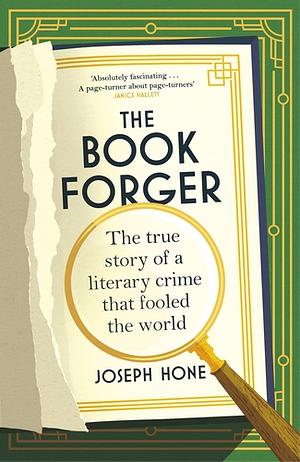
The Paper Chase: The Printer, The Spymaster & The Hunt for the Rebel Pamphleteers
by Joseph Hone
Genres: History, Non-fictionPages: 272
Rating:

Synopsis:In the summer of 1705, a masked woman knocked on the door of David Edwards’s London workshop. She did not leave her name, only a package and a coded means of identifying her courier.
Edwards was a Welsh printer working in the dark confines of Nevill’s Alley, outside the city walls. The package was an illegal, anonymous pamphlet: The Memorial of the Church of England. The argument it proposed threatened to topple the government, but sedition sold well in the coffeehouses of Fleet Street and the woman promised protection. Edwards swiftly set about printing and surreptitiously distributing the pamphlet.
Parliament was soon in turmoil and government minister Robert Harley launched a hunt for all those involved. When Edwards was nowhere to be found, his wife was imprisoned and the pamphlet was burnt in his place. The printer was not the only villain, though, and Harley had to find the unknown writers who wished to bring the government down.
Full of original research, The Paper Chase tears through the backstreets of London and its corridors of power as Edwards’s allegiances waver and Harley’s grasp on parliament threatens to slip. Amateur detectives and government spies race to unmask the secrets of the age in this complex break-neck political adventure. Joseph Hone shows us a nation in crisis through the fascinating story of a single incendiary document.
Joseph Hone’s The Paper Chase: The Printer, The Spymaster, and the Hunt for the Rebel Pamphleteers digs into the publication and censorship of a very particular pamphlet published in 1705 by a Welsh printer working in London, David Edwards. It’s actually available online via the Open Library, if you’re curious to get a look at it.
Joseph Hone paints a vivid picture of the world of illicit printing and its dangers through the reception of the Memorial, and David Edwards’ run from the law. Much of the book focuses on the government minister, Robert Harley, and his attempts to find and punish the authors of the Memorial; this somewhat makes sense as a choice because the best evidence is what Harley had in his hands, with the true authors of the Memorial probably eventually correctly identified, but not through books and papers of their own. (At least, if they exist then Hone doesn’t discuss them at all.)
On the other hand, it means that the narrative is pretty much on Robert Harley’s side — the side of censorship. It does sympathise somewhat with Edwards, whose life and livelihood were threatened while the influential writers of the pamphlet hid (after assuring him of their protection when he agreed to print it for them)… but mostly it follows Harley’s efforts to track down the perpetrators. The tone is anti-Whig, pro-Tory, pro-censorship, I think; perhaps that was somewhat forced upon the author by the angle he used to get at the whole thing and examine evidence, but… Hmm. In general, the heavily fictionalised narrative lends itself to all manner of bias.
In addition, it’s a little awkward to follow up on everything, because although there are notes, the book lacks numbered footnotes, and the bibliography is in the form of a bibliographic essay. I admit, I didn’t dig into that at all, other than looking up the Memorial for myself and a couple of historical facts.
It’s not all negative or ambivalent; I found the first half a little slow, as I tried to get my head around the period (which I don’t know very well), but the second half was pretty good. Mary Edwards (the printers’ wife) seemed pretty awesome, a determined investigator and advocate for her husband, though I wish there’d been more to know about the other women in the case (the woman in the vizard mask who took the material to David Edwards’ press to print, or the servant who was with her). It can be difficult to tell the fiction from the fact, but it was still an interesting read, bearing that in mind.
I’m a bit torn on how to rate it, so definitely bear in mind my caveats.
Rating: 3/5 (“liked it”)

